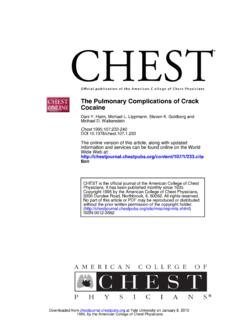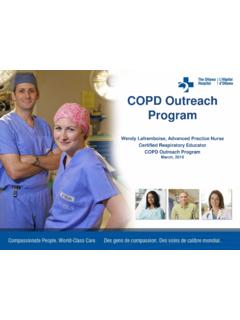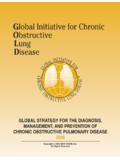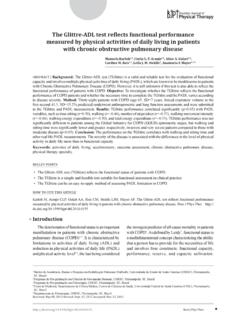Transcription of THE MIND-BODY CONNECTION - Foothill Pulmonary
1 THE MIND-BODY CONNECTION Pulmonary group finds chronically ill patients benefit from group therapy By Suzanne Roto Lake, PsyD ince the onset of managed healthcare, physicians are increasingly under the gun to be productive. With time and resources at premium value, patients medical problems must be addressed as efficiently and quickly as possible. Unfortunately, one of the byproducts of this push for efficiency is that doctors have less opportunity than ever to engage with patients as individuals with complex personalities, lives, and emotional components to their medical disorder. Sometimes, patients will say they feel that we re not paying attention to them as whole persons. And the truth is, we re not, says pulmonologist Prataf Saraf We are focusing primarily on the medical problems, and sometimes that s where we have to leave it.
2 Many physicians are uncomfortable with this situation on a philosophical basis, since it tends to dehumanize the practice of medicine. However, there is also a growing body of scientific evidence that optimal health and healing may depend on acknowledging the emotional aspect. The fact that pyschoneuro-immunology, which studies the interplay of psychology, neurology, and the immune system, has recently emerged as a major field is one clear indication. Scientific research has established both a theoretical basis and strong empirical evidence for a causal impact of social relationships on health, according to published research. Patient support groups, with their strong emphasis on constructive social interaction and conscientious self-care, are one practical manifestation of this CONNECTION .
3 The positive effects of patient support groups in treating seriously ill patients have been demonstrated. Researchers have, for example, successfully developed their hypothesis that support groups composed of women and metastatic breast cancer can significantly improve mood and increase longevity over control groups. Their groups focused on discussing specific salient issues, including fears of death and the dying process, working through doctor-patient problems, and enhancing family support. The results of this work, and others, suggest that may medical patients not just those with metastatic breast cancer might similarly benefit. The Wellness Community is just one organization that has recognized the value of psychosocial support groups for patients with all forms of cancer.
4 Foothill Pulmonary and Critical Care, a large Pasadena-based medical group, decided to implement the concept of support groups for patients once it was recognized that certain patients appeared to need more emotional support in dealing with their medical conditions that the practice was prepared to provide, and that these needs were interfering with their medical progress, says Peter Browne MD, a physician with the group. As a medical doctor, I would sometimes feel that patients wanted from me that I couldn t give them. We hoped that a patient support group might fill that need. Office manager Maryanne Leiby RN believed that organizing a support group for such patients was in order. The group, to be funded by the practice, would be offered at no additional cost to patients of the practice, therefore ensuring that no patient would be denied the opportunity to participate.
5 Leiby, experienced in the physiological aspects of Pulmonary disease, would co-facilitate the group with a clinical psychologist. Not only would her knowledge go far to answer medical questions that might come during meetings, but her involvement would allow the patients to become more familiar with a member of the staff who was a direct liaison to the doctors. The group first met in December 1993, and has continued with about a dozen patients actively participating at any given time, Most of those who initially visit the group rapidly become committed to weekly sessions. These people, diverse on most every other measure, share on overwhelming commonality: a serious or life-threatening lung disorder, such as cancer, cystic fibrosis, asthma, or chronic obstructive Pulmonary disease.
6 They are men and women ranging in age from their early 30 s to late 70 s. The medical office is always alert to patients who may be isolated, overwhelmed, despondent, noncompliant, or especially irritable as potential referrals for the group. I see a real difference in patients who are active in the group, says pulmonologist and critical care specialist Michael Gurevitch MD, I see it in their improved attitudes. They are not as likely to call on the doctors or the office staff between appointments. Frankly, it s my impression that [participating in the support group] may even keep them out of the hospital. Like all individuals diagnosed with disabling, chronic disorders, Pulmonary patients face a multitude of stressful situations that healthy individuals can barely imagine.
7 The terror of being unable to breathe, fear of pain, bewildering medication regimens and equipment, the overwhelming and often impersonal medical establishment, reduced and unpredictable energy levels, fears or premature death, loss of earning ability, and the forced withdrawal from healthy friends and family who are occupied with normal activities of daily life, are all daily preoccupations of people with severe Pulmonary disease. Because they are immersed in a kind of subculture dominated by medical procedures, extensive paperwork, unfamiliar terminology, embarrassing examinations, and physical limitations, these individuals may understandably feel a chasm divides them from those outside the experience. When it comes to chronic illness, notes John Van Dyke MD, the social and emotional concomitants are often worse that the physical disorder itself.
8 Relative social isolation is the norm for chronically ill people, not the exception. Moreover, as the depression brought on by the losses associated with seriously compromised health may manifest in irritability or overt withdrawal in such a situation, the potential benefits of getting involved with a group of peers are obvious. As one of the group members explained. Even the people who love me the most don t truly understand what it s like for me, because they don t go through it themselves. Another said, [Group] is a different world. It s a sympathetic audience, but also one that will confront you if you need it. This is the only place I feel completely comfortable to open up. Most group members agree that it is also helpful to share information with each other, and in the world of modern medicine, an informed patient is a more proactive one, who usually assists the doctor in caring for them.
9 Sharing personal experiences of using the various medications they often have in common, of toting oxygen equipment, of travel tips, and so on, provides practical assistance to lighten the burden of sever illness. In addition, physicians and other specialists ( , in biofeedback, nutrition, rehabilitation, etc.), are regularly brought in to spend an hour to make a simple presentation, but always to answer questions and discuss concerns in a relaxed setting, , outside the medical office or hospital. Beyond education and information sharing, however, it is the group experience of caring camaraderie, openness, unpretentiousness, and a closeness bred by empathy and familiarity with suffering that apparently works to raise spirits. For example, one woman whose condition was declining finally summoned the courage to share her fears of death.
10 This elicited much empathetic and deeply felt discussion by others, which clearly comforted and relived her. Another time, the group laughed in rueful exasperation with a young woman who described the umpteenth time she had to explain to coworkers that her constant coughing would not be improved by a new cough syrup on the market. In fact, the group has become a sort of family. They have comported one another through crises, expressed awe at the heroism that sometimes emerges in the midst of coping, derived hope from others optimism, and learned to confront one another over, say, lapses in self-care or denial of symptoms. Occasionally, also, members meet outside the group, getting together during the week to mall walk for exercise, or inviting one another to their homes during the holidays.





